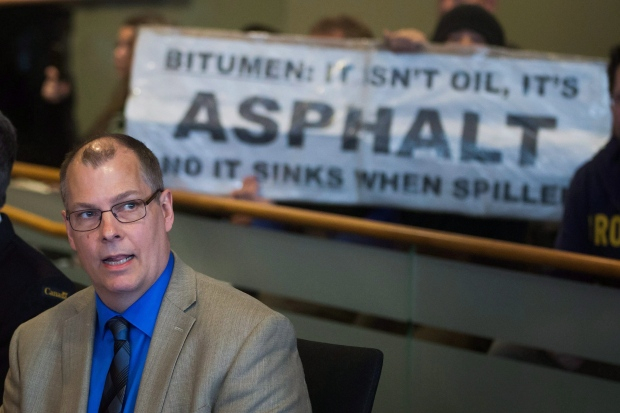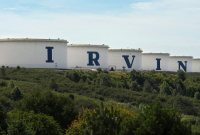Support strong Canadian climate journalism for 2025
The chief executive of Canada’s National Energy Board (NEB), Peter Watson, gave his staff at the pipeline regulator instructions for seven specific tasks after emerging from a series of controversial meetings in Montreal with former Quebec premier Jean Charest and others in January 2015, National Observer has learned.
A newly-released email shows that staff concluded the meetings believing they had done terrific work to boost the regulator’s credibility in Quebec, while gaining some new ideas from Charest and others — including prominent business leaders and Montreal Mayor Denis Coderre — about how to further polish their image and increase public trust for new pipeline approvals.
“I will note that the meetings we had in Montreal over the last two days have been very successful in building awareness and credibility of the NEB in Quebec,” wrote Jean-Denis Charlebois, an NEB director in an email sent to several senior officials on Jan. 16, 2015, including chief executive Peter Watson and chief operating officer Josée Touchette.
And at that point, Charlebois listed the seven tasks that Watson wanted the Board to carry out in the wake of those meetings in Montreal.
Charlebois and the other meeting participants from the regulator, including Watson, were eventually reassigned or forced to recuse themselves from dealing with TransCanada Corp.'s proposed Energy East pipeline project, now under review by the NEB, in the wake of revelations that Charest was on the payroll of pipeline company when they met with him.
But in 2015, NEB staff proceeded with the tasks, unable to know that their work would soon be engulfed in controversy.
Charlebois explained in the Jan. 16 email, released to National Observer through access to information legislation, that he had discussed Watson’s instructions over the phone with Touchette and that further instructions would be delivered to other business units within the NEB to carry out further action.
André Bélisle, the president of a Quebec environmental group, the Association québécoise de lutte contre la pollution atmosphérique, said that those details raise fresh questions about the need for a public inquiry into the regulator, since they reveal that other federal staffers such as Touchette were made aware of the meeting and involved in subsequent strategies that were prompted, in part, by political advice from Charest.
At that time, the NEB was preparing for the start of public hearings to review the Energy East project, a 4,500 kilometre proposed pipeline running from Alberta to New Brunswick that would ship up to 1.1 million barrels of oil per day. Energy East is considered to be the largest project of its kind ever proposed in Canada. The email also reveals that the “hearing management team” for Energy East was given instructions and expected to “seek input from Peter and present these options to the three-member panel that was presiding over the hearings.
“At the end, maybe we’ll find out everyone at the NEB participated (in the strategy to gain approval for pipelines),” Bélisle told National Observer in an interview. “We need to have the full list of everyone who was aware (because) the more we proceed, the more we find other names.”
The NEB has declined to say whether it made any changes to Watson's instructions after learning that Charest was working for TransCanada at the time that pipeline regulator's executive and other officials met with the former politician.

Two of the seven items that Watson put on the list after the Charest meeting were directly related to the NEB’s process for reviewing Energy East. One of the seven was censored by the NEB, using a provision of Canada’s Access to Information Act that allows federal organizations to withhold information related to a matter under consultation or deliberation. National Observer has asked the office of the federal information commissioner, Suzanne Legault, to investigate whether this censorship was justified under the law.
Peter Watson's instructions after Charest meeting
Here's the full list of instructions from the NEB's chief executive, Peter Watson, to staff at the pipeline regulator, delivered after his private meeting with Jean Charest.
- Agreement with Montreal: Watson asked the NEB to finalize a memorandum of understanding with the city of Montreal on relations between the city and the regulator.
- Regional Offices: Watson asked staff to deliver a plan to deploy new regional offices for the NEB in Montreal. The instructions also proposed a public signing of the above-mentioned MOU as a “great event to coordinate with the opening of this office” in Montreal.
- Thank you letters: “Peter wants to send a thank you letter to the people we’ve met in Montreal,” Charlebois wrote in the email, with special thanks for Montreal Mayor Denis Coderre, seeking feedback on the MOU and promoting plans to hire a new public relations spokesperson for the NEB in Montreal.
- CENSORED. The NEB doesn’t want the public to know, at this time, what the fourth item on the list was.
- External Support for National Engagement Initiative. “Our meetings in Montreal, while very successful, have highlighted the fact that we could benefit from the support of an external third party to identify key stakeholders to meet during the Quebec leg of the National Engagement Initiative,” Charlebois wrote. “Peter wants us to investigate the possibility of contracting with an organization that has strong local knowledge to help us do that.”
- Energy East Hearing Process: “The NEB could benefit from developing innovative ways to hear from Canadians as part of the Energy East process,” Charlebois wrote. “This can include ‘pre-consultation’ sessions or technical conferences on specific issues. Peter asked us to investigate these options for consideration by the Energy East Panel.” The instructions indicated that the management team for the hearings would also be involved, seeking input from Watson.
- Application to Participate: Watson asked the staff to look at the NEB’s application process to make it easier for people to apply to participate in the hearings for Energy East. “Peter is expecting a concise briefing note on this by the end of next week,” wrote Charlebois.






Comments
Just the slick from the sunken dilbit.
Keep digging - there's more where that came from.
Always will be unless the NEB is dismantled and starts afresh with new rules, true accountability, and NON-INDUSTRY composition.
Peter Watson needs to be terminated immediately. I don't care how much it will cost. Canada will benefit since clean, sustainable energies will be promoted and developed. He is Hitler and I want to sue him for his erroneous decisions. Nobody is worse!
Peter Watson needs to be terminated immediately. I don't care how much it will cost. Canada will benefit since clean, sustainable energies will be promoted and developed. He is Hitler and I want to sue him for his erroneous decisions. Nobody is worse!
The To Do List along with most of the other emails all show the NEB does no actual investigating or considering before rubber stamping these projects. Why would the NEB ever open an office in Montreal unless they had already decided to approve Energy East? Making a big hype over an office and a handful of jobs is supposed to fool folks into believing the NEB is somehow looking after the interests of Canadians? Redacting #4 was not smart, because what readers will imagine could be far worse than it actually was. Unless of course it really was that bad. Either way, redacting is unacceptable and the whole rotten cesspool must be fully investigated. NEB staff and those from industry colluding and breaking the rules must be prosecuted to the full extent of the law. Any companies involved must have their approvals revoked because they are obviously tainted. Rip the NEB apart and replace everyone with those that have no ties to the industry, then restart all applications to include full environmental and GHG issues. If they have nothing to hide, there should be full transparency and the public should be able to see everything.